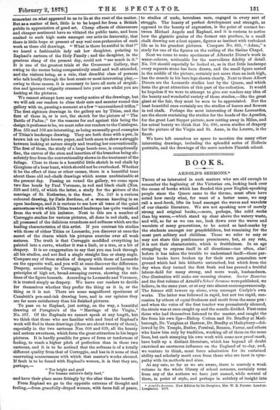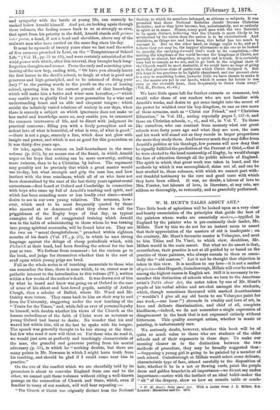BOOKS.
ARNOLD'S SERMONS.*
THOSE of us interested in such matters who are old enough to remember the beginning of the Victorian era, looking back over the ocean of books which has flooded this poor English-speaking people since the Queen came to the throne, must often have noted how rarely what, for want of a better name, we may call a seed-book, lifts its head amongst the waves and wavelets of our chaotic literature. We are not speaking now of merely strong and original books,—more, perhaps, like solid rocks than big waves,—which stand up clear above the watery waste, and will, so far as we can see, look down over the waves and wavelets of many generations, to be noted as land-marks by the students amongst our grandchildren, but remaining for the most part solitary and childless. Those we refer to may or may not share this posthumous prominence, but, at any rate, it is not their characteristic, which is fruitfulness. In an age struggling to express itself in all directions—too often, alas! before it has taken the trouble to understand itself—these par- ticular books have broken up for their own generation new ground which had lain hitherto untouched, but which from the day when they turned the first fresh sod has proved a fruitful labour-field for many strong, and more weak, husbandmen. One illustration will make our meaning clearer. Senor Resartus and the first volume of Arnold's School Sermons were published, we believe, in the same year, or at any rate almost contemporaneously. The former still towers up alone, even amongst Carlyle's own works. The latter was followed in rapid, but not too rapid, suc- cession by others of equal freshness and merit from the same pen : and when the voice of the first teacher was prematurely silenced, the strain was at once caught up and the mantle divided. First came those who had themselves listened to the master, and caught the fire from his own lips—Bishop Cotton and Dr. Bradley at Marl- borough, Dr. Vaughan at Harrow, Dr. Bradby at Haileybury—fol- lowed by Dr. Temple, Butler, Percival, Benson, Farrar, and others who knew him only by tradition, working all of them on the same lines, but each stamping his own work with some new proof-mark, have built up a distinct literature, which has beyond all doubt exercised an enormous influence on the England of to-day, and, we venture to think, must force admiration for its sustained ability and scholarly merit even from those who are least in sym- pathy with its methods and aims.
At any rate, so far as we are aware, there is scarcely a weak volume in the whole library of school sermons, certainly none from any of the authors we have just named, while several of them, in point of style, and perhaps in subtlety of insight into
• Arnold's Sermons. New Edition by his Daughter, Mrs. W. E. Forster, London: Longmans. 1878.
and sympathy with the battle of young life, can scarcely be ranked below Arnold himself. And yet, on looking again through
these volumes, the feeling comes back to us as strongly as ever, that apart from his priority in the field, Arnold stands still primus inter pares, a head, if not a head and shoulders, above any of the stalwart men who have carried on the same flag since his day.
It must be upwards of twenty years since we last read the series of five sermons preached in Lent, on the "Temptations of School Life" (Vol II., pp. 31 to 64), and were certainly astonished at the vivid power with which, after this interval, they brought back long- forgotten thoughts and scenes. From the early and searching ques- tioning of the new boy, ending with, "Or have you already learnt the first lesson in the devil's school, to laugh at what is good and generous and high-principled, and to be ashamed of doing your duty ?" to the parting words to the youth on the eve of leaving school, spurring him to the earnest pursuit of that knowledge which will make him a better and wiser man hereafter,—" which may enable you to glorify God in your generation by a wise and understanding heart and an able and eloquent tongue ; which amidst the infinitely varied relations of society in our days, when there is scarcely a subject on which ignorance does not make us less useful and knowledge more so, may enable you to ornament the common intercourse of life, and to direct with judgment its practical concerns ; filling you with a lively perception and an ardent love of what is beautiful, of what is true, of what is good," —there is not a page, scarcely a line, which does not glow with insight and power, and which is not as good for this generation as it was thirty-five years ago.
Or take, again, the sermon on half-heartedness in the same volume (p. 205), by no means one of the finest, in which Arnold urges on his boys that nothing can be more unworthy, nothing more ruinous, than to be a Christian by halves. The argument may possibly not be precisely that which a great master would use to-day, but what strength and grip the man has, and how instinct with the true manliness, which all of us who have not been demoralised by the cant of the last thirty years against moral earnestness—first heard at Oxford and Cambridge in connection with boys who came up full of Arnold's teaching and spirit, and which has been sounding more or less loudly ever since—would desire to see in our own young relatives. The sermons, how- ever, which used to be most frequently quoted by those who sneered at or denounced what they chose to call the priggishness of the Rugby boys of that day, as typical examples of the sort of exaggerated training which Arnold was in the habit of administering to those whom he was busing into young spiritual coxcombs, will be found later on. They are the two on "moral thoughtfulness," preached within eighteen months of his death (Vol. IV., 15. 23), in which he uses strong language against the deluge of cheap periodicals which, with .Pickwick at their head, had been flooding the school for the last year or two. We forbear from comment ; let the curious go to the book, and judge for themselves whether that is the sort of stuff upon which young prigs are bred.
Full as the whole series is of touching memorials to those who can remember the time, there is none which, to us, comes near in pathetic interest to the introduction to this volume (IV.), written within a few weeks of the author's death. It was drawn out of him by what he heard and knew was going on at Oxford in the case of some of his ablest and best-loved pupils, notably of Arthur Clough, then a scholar of Balliol, where Mr. Ward and Mr. Oakley were tutors. They came back to him on their way to and from the University, staggering under the new teaching of the "Tracts for the Times," and, while full as ever of personal loyalty to himself, with doubts whether his views of the Church as the human embodiment of the faith of Christ were as reverent as young Oxford had learnt to desire. No wonder that his soul waxed hot within him, till at the last he spake with his tongue. The speech was generally thought to be too strong at the time, but few who read it now will think so. For those who do read it, we would just note as perfectly and touchingly characteristic of the man, the graceful and generous parting from his mortal adversary (p. 53), in which he "nothing doubts, but there are many points in Mr. Newman in which I might learn truth from his teaching, and should be glad if I could come near him in practice."
On the eve of the conflict which we are cheerfully told by its promoters is about to convulse England from one end to the other, we cannot quit these volumes without citing a well-known passage on the connection of Chinch and State, which, even if familiar to many of our readers, will well bear repeating :—
"The Church of Christ was originally distinct from the National London: Macmillan end Co. Drs. Society, to which its members belonged, as citizens or subjects. It was promised that these National Societies should become Christian Societies; and so they have become, but, unfortunately, not so entirely in spirit as in name. Hence, many good men wish the two Societies to be again distinct, believing that the Church is more likely to be secularised by the union than the nation is to be christianised. And doubtless, as things are and have been, this belief has too much to warrant it. But on the other hand, as things ought to be, and as I believe they yet may be, the happier alternative is the one to be looked to, namely, the carrying-forward God's work to its completion,—the making the kingdoms of the world become the kingdoms of Christ, not partially or almost, but altogether, in spirit and in truth. It is certainly very bad to remain as we are, and to go back to the original state of the Church would be most desirable, if we could have no hope of going on to that glorious state of perfection which Christ designed it. But this hope is too precious to be lightly abandoned, and our present state is a stop to something better, however little we have chosen to make it so ; the means are yet in our hands, which it seems far better to use even at the eleventh hour, than desperately to throw them away."" (Vol. II., Preface, We have little space left for further extracts or comment, but would refer those of our readers who are not familiar with Arnold's works, and desire to get some insight into the secret of the power he wielded over his boy-kingdom, to one or two more of these sermons, such as "Christ our Friend," and "Christian. Education," in Vol. HI., noting especially pages 7, 137-8, and those on Christian schools, v., vi., and vii., in Vol. V. To those like ourselves, who can contrast from memory what our great
schools were forty years ago and what they are now, the man and his work will stand out as they recede in larger proportions,
the more they study them. And however much they may differ from Arnold's politics or his theology, few persons will now deny that he signally fulfilled the prediction of the Provost of Oriel,—that if he were elected to the head mastership of Rugby, he would change the face of education through all the public schools of England.. The spirit in which that great work was taken in hand, and the-
methods by which it was accomplished, shine out of, and can be best studied in, these volumes, with which we cannot part with-
out thankful testimony to the care and good taste with which. they have been edited. It was, no doubt, a labour of love to, Mrs. Forster, but labours of love, in literature, at any rate, are seldom so thoroughly, so reticently, and so gracefully performed..



































 Previous page
Previous page